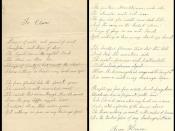On the most basic of levels, Donne's 'The Flea' can be read as a witty and persistent attempt to win over a resisting potential lover. However, beneath this simple theme of the poem lie interesting ideas and concepts that go hand-in-hand with what one would expect from the man whom Samuel Johnson described as a 'metaphysical' poet. Writing at the cusp of the Renaissance, Donne's rejection of the old Elizabethan order and conventions is projected through something as simple as the life cycle of a mere flea. Though writing about this insect was a fashionable contemporary theme, Donne was unique in his treatment of such a topic, converting 'the flea' from a creature commonly used to convey lewd and jocose descriptions about the female body, to a frontage for a poem with an interesting level of questioning social issues. Using the flea and the woman to whom the speaker is addressing to present his conflicting views of sexuality, women, morality and religion, Donne presents the reader with a poem that is not only witty and enjoyable to read, but highly revealing of Donne's status as a Renaissance poet and the issues with which he was grappling at the time.
Revolving around the union of two potential lovers, 'The Flea' could, in theory, be described as a love poem. However, as a poet heavily influenced by the Renaissance, Donne was questioning the very notion of love, rejecting the idealised aestheticism that had been prevalent in the Elizabethan courts. Whilst previous poetic tradition revolved around worship of the female through Petrarchan sonnets and flowery imagery, in 'The Flea' Donne refrains from adopting an embellished, mystical approach to the relations between man and woman, instead focusing on the act of sex itself.
'how little that which thou deniest...


